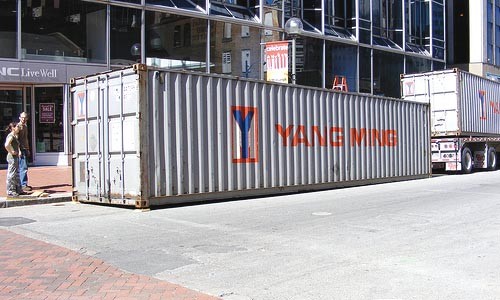What's to become of the Three Rivers Arts Festival, at least as we've known it? The Carnegie Museums of Pittsburgh, which took control of the venerable summer fest a month ago, hasn't announced any plans, but the takeover suggests more changes are forthcoming. And Elizabeth Reiss, the festival executive director whose position the Carnegie eliminated, says it's time to rethink how the festival is funded and how it's run.
Carnegie Museums President David Hillenbrand said that both Reiss' position and an associate-director post, held by Chris Taylor, were eliminated as cost-cutting moves. In the past year, Hillenbrand said in a statement, "[W]e have become increasingly concerned about the financial health of the Festival." The takeover would let the Carnegie Museums "better assess the [festival's] finances [and] re-evaluate its operations and its mission."
The festival's 2008 budget was $1.6 million, most of it spent on Downtown's free, 17-day showcase of live music, visual art and crafts vendors; the festival also runs First Night, Downtown's annual New Year's Eve celebration. While the Carnegie declines to discuss additional numbers, Reiss said in an interview that this year's deficit was between $300,000 and $400,000.
Reiss, director since 2001, traces most of the festival's financial troubles to 2007, when its longtime home, Point State Park, was closed for renovations. The festival relocated to Downtown streets, but Reiss says attendance plummeted from an estimated 600,000 to about 450,000 in 2007, and might have dropped even further this year, the second without the park. Smaller crowds meant less money from sponsors, even as expenses kept rising: Blocking streets, for instance, required hiring more police. (City Paper has been a media sponsor of the festival.)
To be sure, Reiss' tenure as director was not without controversy. This year, the festival purchased 10 shipping containers as display space -- containers that were barely habitable during a heat wave. Museum insiders also report differences over managerial style and say the Carnegie's hands-off approach amounted to a lack of oversight.
Reiss acknowledges missteps of her own. For one thing, in scrambling to compensate for losing the park, she says, "I got so stuck in [the] emergency mode of getting the event up that it was hard for me to do that level of strategic planning."
Though the Carnegie has long been linked to the arts festival, the event has functioned mostly autonomously for years; in fact, the takeover reversed a March announcement by the Carnegie that the festival would become an independent entity.
But Reiss says the size of the budget deficit -- including this year's shortfall -- made independence unlikely.
In Reiss' view, the festival's biggest financial problem is its dependence on rental fees from food and crafts vendors, which together constitute about 40 percent of operating revenue. That was "a very fragile model," she says. "I always called it the house of cards."
Reiss says the festival needs a more stable revenue source. That's something it lost a decade ago, when a county hotel tax was eliminated with the creation of the sales-tax-funded Allegheny Regional Asset District (which doesn't fund events). And efforts to get more state funding have been slow to bear fruit.
The Carnegie appointed as acting festival director Colleen Russell Criste, deputy director of The Andy Warhol Museum (one of four Carnegie Museums). Criste says that the Carnegie intends to make next year's festival, which would be the 50th, happen. But she says finances and the way forward are still under review. And ongoing construction projects, plus possible restrictions on using Point State Park, could make staging the event tricky. "We might need to be a little bit creative," says Criste.
Reiss, for her part, advises a complete overhaul. "I think it's the best thing for the festival to just yank the system. Pull everything apart. Start it over," says Reiss. "I really do believe [the takeover] was the only hope for the festival."















